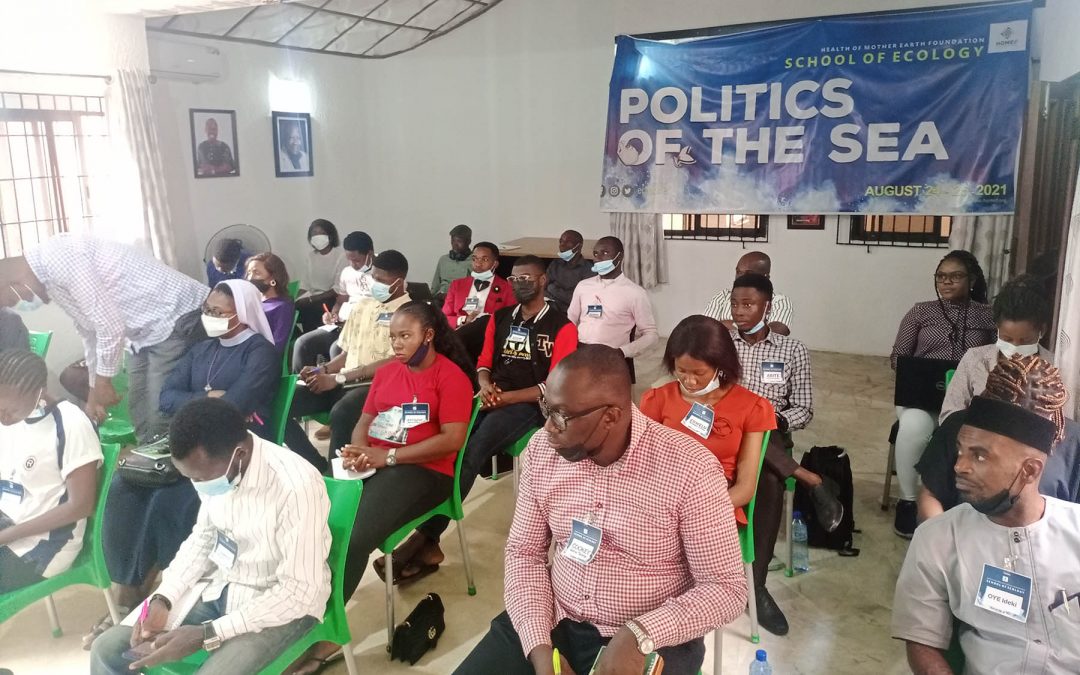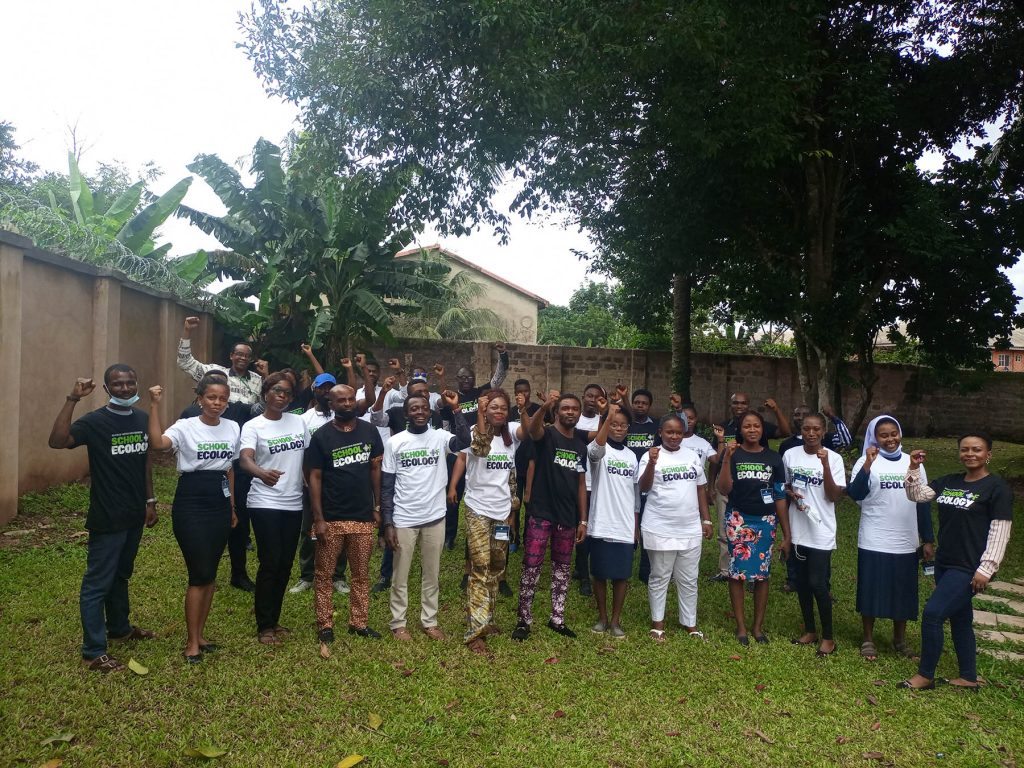As efforts are being made towards restoring the ecosystem, different concepts and ideologies are springing up. While some are geared towards improving the quality of life and proffering real sustain-able solutions, others lean towards the continuous profiting of big corporations at the expense of the wellbeing of local communities.
Health of Mother Earth Foundation (HOMEF) hosted a 2days School of Ecology session on Politics of the Sea on August 24 – 25. The session which focused on the technicalities and politics of the Blue Economy was aimed at promoting a cross-sectoral understanding of the Blue Economy concept.
Nnimmo Bassey, the Director of HOMEF opened the session with a welcome address where he called for an end to sea piracy, emphasizing on the need for and the protection of our aquatic ecosystem.
“We want to protect our fisheries, we want to protect our aquatic ecosystem, and we want to call an end to sea piracy and human right abuse from security agents in our waters. We are calling for the use of marine resources for our citizens in a sustain-able way. We are calling for an end to seeing and treating our Ocean, Rivers and creeks as waste dumps. We are especially calling for a halt in investment in searching for new fossil fuels, expansion of oil wells in our water bodies and other frontal basins.”
One of the speakers, a former Director-General of the Nigerian Maritime Administration and Safety Agency, Dr. Dakuku Peterside in his session on Tuesday, lamented the illegal and unreported activities carried out at the Gulf of Guinea which has made the Gulf the most dangerous waterways in the world. In his paper presentation titled ‘Security in the Gulf of Guinea‘, he stated that the unique ecosystem has attracted global attention and consequent dangers in the waterways.
“For many reasons, the Gulf of Guinea is a place of interest internationally. The Gulf of Guinea is a place of interest continentally. It is a place of interest to those who are into shipping. It is a place of interest, for those who are into fishing. So, for diverse reasons, the ecosystem of the Gulf of Guinea is unique. It is the third largest in the world. The Gulf of Guinea accounts for 2.7% of fossil natural gas reserve globally, and it is one of the richest fishing ground globally. This is because some of the fish spices you may find in the Gulf of Guinea may not be found elsewhere in the world. So it’s a unique ecosystem,” he said.
The Executive Director of Lokiaka Women Development and Resources Center, Martha Agbani in her presentation noted that oil pollution is particularly threating rivers and other water bodies in Ogoni land. She noted that various food products have gone into extinction as a result of this pollution.
“The Ogoni People are rich in diverse culture and varieties of food but the depths of pollution in the region has pushed some of these into extinction. This pollution has been left unattended to over the years and the government seems to act like it is not aware or that it lacks the capacity to deal with the problem. The encroachment and rapid invasion of Nipa Palm is another issue that is threatening the health of our aquatic ecosystem. We see people go into the river to fish and return empty handed with their legs and nets soiled with crude oil. At Lokiakia center, we decided to come up with ideas to replant mangroves in the Ogoni land pending when the cleanup will commence. We now see things like periwinkles return to some parts of the river as the land is being treated and mangroves begin to regrown. At least these little quantity can serve individuals and families for their immediate use. We see mangrove planting as means of reopening the river live for more use.”
Nnimmo Bassey in his second session titled ‘Politics of Turbulent Waters’ noted that the position of Africa is in the center of the world, but that the challenge of being in the center is that it is very accessible from every part of the world which makes it easy to be exploited. He noted that Africa has been impacted because of its geographical location, which it makes it easy for everyone to have access to its aquatic re-sources.
“Africa is extremely exploited, the amount of money that comes into Africa is less than the resources that leave to other parts of the world. We are appealing that the young people become actively involved in nonpartisan politics and what I’d call the politics of listening. The oil infrastructure begins from the natural re-sources to the finished product. When the ocean warms up as a result of global warming, fish suffer and die because they cannot survive in that temperature, some migrate to favorable habitats, which means less catch for our fishers at the sea. When these fish die, they blame it on effluents from agricultural processes rather than accept the responsibility that it is caused by oil exploration activities. This is a big alarm for Africa to sit up and preserve its water bodies, and ecosystems”.
In this session, we were privileged to have diversity of speakers from other parts of Africa, who shared their experiences and wealth of knowledge with our scholars. Desomd D’Sa from South Durban spoke on ‘Extraction, Pollution and Chaos in South African Waters’; Prof. Sofiri Peterside of the University of Port Harcourt taught on the political cost of the Cargo Cult; Neth Dano of the ETC Group exposed the scholars to the threats posed by geoengineering to the oceans and its resources and how this is implicated in climate change; Nengi James spoke on a concept he titled ‘Oceanification of the Niger Delta’; Kwami Kpondzo of FoE, Togo shared on the impacts of the Phosphate Factories of Togo & Morocco on fisheries and other aquatic re-sources. Diana Nabiruma, a Senior Communications officer at AFIEGO, Uganda and Ako Amadi, the director of CCDI spoke on ‘Fossil infrastructures and Inland waters and Aquatic Ecosystem Exploitation in the gulf of Guinea’ respectively on the second day.
It is believed that Africa can build a Blue Economy using the experience gained from the Green Economy approach towards a low-carbon economy. According to the Economic Commission for Africa (ECA), The Blue Economy in the African context covers both freshwater and marine spaces, including oceans, seas, coasts, lakes, rivers, and underground water. It encompasses a range of productive sectors, including fisheries, aquaculture, tourism, transport, shipbuilding, energy, bioprospecting, underwater mining and related activities.
Activities in some of these sectors – like underwater mining and related activities – will undermine the ecological integrity of African freshwater and marine ecosystems. A look at our water bodies polluted by oil spills and other industrial wastes presents clear evidence that human activities have dealt harmful blows on aquatic ecosystems. Adding to the impacts of climate change and the massive destruction of mangrove forests.
Mr. Bassey in closing the session stated HOMEF’s concerns for the Blue Economy concept under what he titled ‘the blues of Blue Economy’. In his words, “The push for a Blue Economy is just not what it claims to be. It is rather a push for deriving of economic gains from our freshwater and marine ecosystems. It means a fundamental shift in the way streams, rivers, lakes and the oceans are perceived. The Blue Economy is a top-down concept that claims to enhance the living standards and livelihoods of the people. Investments in marine biotech research especially for cosmetics, pharmaceuticals, bioenergy and “new” food is expected to reach USD 5.9 billion by 2022 and investment in this sector can raise peculiar problems for Africa with its largely lax and 7 compromised biosafety regimes . Illegal fishing and maritime insecurity will become more pronounced with the enthronement of the Blue Economy.”







